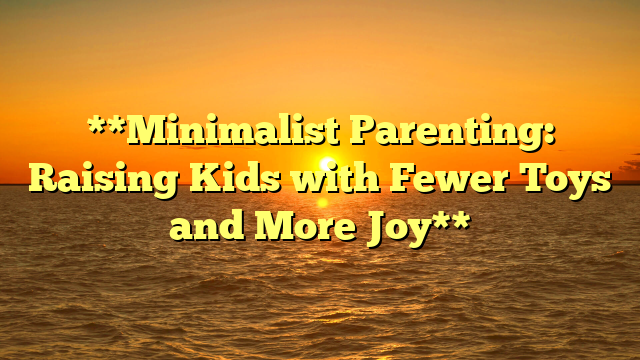
Parenting in today’s world often comes with an overwhelming amount of toys, gadgets, and distractions. While many believe that more toys equate to happier children, research and experience show that simplifying a child’s environment can lead to greater creativity, deeper focus, and stronger family connections. Minimalist parenting is about raising kids with fewer toys and more joy by focusing on meaningful experiences and intentional living. Here’s how you can embrace minimalist parenting and create a fulfilling childhood for your kids.
1. The Benefits of Fewer Toys
Reducing the number of toys in your home can have numerous benefits. When children have too many choices, they often become overwhelmed and lose interest quickly. Fewer toys encourage them to use their imagination, develop problem-solving skills, and engage in deeper, more meaningful play. Additionally, a decluttered environment reduces stress for both parents and children, creating a more peaceful home.
2. Choosing Quality Over Quantity
Instead of filling your home with inexpensive, easily breakable toys, opt for high-quality, open-ended toys that foster creativity and development. Wooden blocks, art supplies, puzzles, and books can provide endless hours of entertainment while also supporting cognitive growth. Prioritizing quality over quantity ensures that each toy serves a purpose and adds value to your child’s playtime.
3. Encouraging Experiential Learning
Minimalist parenting emphasizes experiences over material possessions. Instead of buying another toy, consider activities that promote learning and bonding, such as nature walks, museum visits, or baking together. These shared experiences create lasting memories and teach valuable life skills that toys cannot provide.
4. Rotating Toys for Renewed Interest
If you’re hesitant to part with all your child’s toys, try implementing a toy rotation system. Store some toys away and switch them out every few weeks. This keeps playtime fresh and exciting while preventing toy overload. Children will appreciate their toys more when they have fewer at a time.
5. Teaching Gratitude and Generosity
A minimalist approach to parenting also helps children develop gratitude and generosity. By having fewer toys, kids learn to appreciate what they have and take better care of their belongings. Encourage them to donate toys they no longer use to children in need, fostering a sense of empathy and community.
6. Creating a Calm and Organized Space
A clutter-free environment promotes a sense of calm and focus. Organize toys in designated areas, use storage bins to keep things tidy, and maintain a simple, inviting play space. A minimalist home helps children feel more secure and comfortable, reducing overstimulation and promoting relaxation.
7. Setting a Positive Example
Children learn by example, so practicing minimalism yourself sets the tone for their behavior. Show them the value of living with intention, making mindful purchases, and appreciating non-material joys. By demonstrating these principles, you help shape their attitudes toward consumption and happiness.
batmantoto is about raising children in an environment that values experiences, creativity, and simplicity over material excess. By reducing toys and focusing on quality interactions, you can foster a happier, more mindful childhood. Embracing this approach not only benefits your kids but also strengthens family bonds and creates a peaceful, joyful home.




